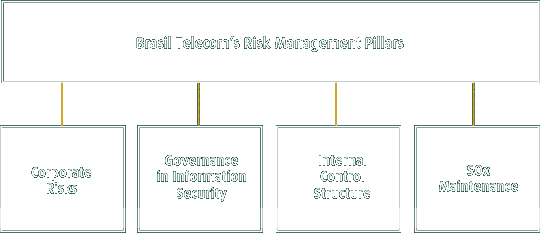







It is Brasil Telecom's opinion that risk management is an essential part of good corporate governance practices. The goal is to preserve business integrity, as well as the integrity of material and financial assets. The Governance Model for the Management of Corporate Risks is based on the following pillars:

RISK FACTORS MONITORING
Strategic Risk
The trend of partial substation of fixed line traffic to mobile telephony is currently being studied by Brasil Telecom. In order to mitigate this risk, the Company has defined the development of new paths for growth as one of the pillars for its business strategy, having as its main initiative the acceleration of revenue growth both in mobile telephony and data transmission.

Financial and Market Risk
Brasil Telecom's loan and financing operations are subject to market risks, among which are the variation in interest rates, inflation, and the exchange rate, which are constantly monitored by the Company.
In order to mitigate exchange rate risk, Brasil Telecom has contracted hedge operations from financial institutions, with 3.6% of all indebtedness exposed to exchange rate variation.
With regard to financial investments, Brasil Telecom tends to be conservative in its investment choices. Investments are maintained in financial investment funds (FIFs), and investments in own portfolio in private securities (CDBs) issued by first-tier financial institutions, federal notes, sovereign notes issued by governments with excellent credit risk and overnight operations, backed by notes issued by financial institutions abroad, with low credit risk. Portfolios of FIFs are composed mainly of federal notes and CDBs issued by first-tier financial institutions. Exposure to market risk is monitored daily through the VaR (Value at Risk) method, which quantifies the risk of loss in these investments.
Operational Risk
Brasil Telecom takes out specific insurance policies such as Operational Risk and Business Interruption Insurance to protect its assets. The Operational Risk Insurance covers all property against physical damage caused by fire, lightning, explosion, wind storms, robbery, flooding, and inundation. In order to ensure full replacement of its assets, the Company updates, on a monthly basis, the value and quantity of lines installed per branch. The Business Interruption Policy covers damages resulting from the interruption or disturbance of working capital caused by any physical damage to property.
The civil liability of managers, board members, and executive Officers of Brasil Telecom is ensured by D&O policy (Directors and Officers), contracted by Brasil Telecom Participações S.A., which pays damages to third parties up to the maximum limit ensured in the presence of evidence of management default.
Regulatory Risks
Brasil Telecom operates according to concession contracts and licensing agreements signed with the National Telecommunications Agency (ANATEL) and under the industry's general and specific legal and regulatory provisions. Any change in the established rules may affect the business. For this reason, the Company monitors the development of regulations and the industry overall, acting proactively to minimize regulatory risk.
SYSTEMATIC SUPERVISIONOF THE SUPPLEMENTARY PENSION OLAN FOUNDATIONS
Brasil Telecom has systematically supervised the Supplementary Pension Plan Foundations that it sponsors. In addition to ensuring legal compliance, this initiative contributes to the implementation of better governance practices in these Foundations. A Supervision Committee has been created, which is composed of Board members representing Grupo Brasil Telecom, promoting the exchange and transfer of knowledge between the Foundations and the Sponsor Company.

AUDIT
Internal Audit
Control Environment Assessment
Brasil Telecom's Internal Auditing has a preventive focus, and thus aims to predict occurrences and alert the management. Assessments and reports on processes, as well as the risk management of the organization, recommending improvements in the adequacy and efficacy of the risk management model, are periodically developed.
Assessment procedures comply with standards of COSO, COBIT, Audit Standards of PCAOB, and The Institute of Internal Auditors. Control Self Assessment is one of the mechanisms used to make it easier for processes with longer Audit cycles to be covered within the year, so as to facilitate the monitoring of the risks involved.
In this environment of thorough assessment and monitoring of processes, risks, and controls, it was possible to obtain a SOX Certification for the 2006 financial statements, disclosed in 2007.
Independence, Regulation, and Relationships
The independence of the Internal Audit is set forth in the Bylaws of the Company, which hierarchically connects the area to the Board of Directors. The goals, independence, purpose, scope, responsibilities, authority, results presentation, rules of the Internal Audit, and main procedures of the activity are provided for in the Regulation of the Internal Audit Activity (Charter), in compliance with the rules and standards of The Institute of Internal Auditors.
With regard to the relationship structure, recommendations made by the Internal Audit are directly monitored. In the internal environment, a previous discussion with the managers of processes is part of the process, and mitigating initiatives are informed to the Board of Executive Officers, to the Committee of Processes and Risks, to the Fiscal Council, and to the Board of Directors.
Independent Auditors
Under the terms of Ruling CVM no. 381/03, Brasil Telecom Participações S.A. regularly submits the fees and types of services to be provided by independent auditors to approval by the Company's Board of Directors, considering the Fiscal Council's opinion.
The policy for hiring services fulfills the principles that safeguard the independence of the auditor, according to international criteria, which are as follows: the auditor must not audit his own work nor carry out managerial responsibilities for his client nor promote the interests of his client.
During the year of 2007, Deloitte Touche Tohmatsu Independent Auditors was hired for jobs other than those directly related to the auditing of financial statements. The total fee for these services was 5% below the fees related to the independent auditors' services.